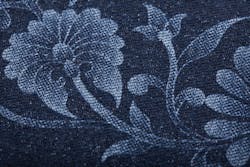Industrial laser maker Rofin-Sinar UK's (Kingston Upon Hull, England) products are used by major suppliers to the denim jeans industry. The company's lasers are incorporated into the finishing stage of the jean-making process, allowing manufacturers to reduce chemical and water use and the time taken to make faded, distressed, and ripped jeans.
Related: Rofin-Sinar laser cutting project receives funding
The finishing systems, which incorporate carbon-dioxide (CO2) lasers from the company, transfer a grayscale design to the surface of the denim by varying the intensity of the focused laser beam. The laser beam modifies the surface of the fabric, designing shading, rips, and intricate patterns without damaging the texture of the material.
With lasers, jean manufacturers can finish a pair of jeans every 90 seconds instead of 20 minutes—a significant advantage for an industry faced with increased competition and a fast fashion cycle. By comparison, other surface-altering techniques, such as stonewashing and bleaching, pose problems like non-reproducible designs, an inability to apply the design to different fabrics, and reduced fabric quality after processing, not to mention the toxic nature of the harsh chemicals needed.
"We have been actively supporting our customers in the denim industry for over 15 years to get this innovative technology accepted by the market," says Ken Lipton, managing director of Rofin-Sinar UK. "The productivity improvement it brings, together with the environmental benefits, have resulted in a significant increase in our business in this market."
Established in early 1998, the company develops and manufactures sealed CO2 lasers in the 0–1000 W range, including a range of sealed CO2 lasers and power supplies for industrial processing and marking applications. The lasers are employed in the textile, automotive, and packaging industries, and in a wide variety of applications involving cutting, drilling, welding, and marking of plastics, metal, fabrics, and ceramics.
For more information, please visit www.luxinar.com.


